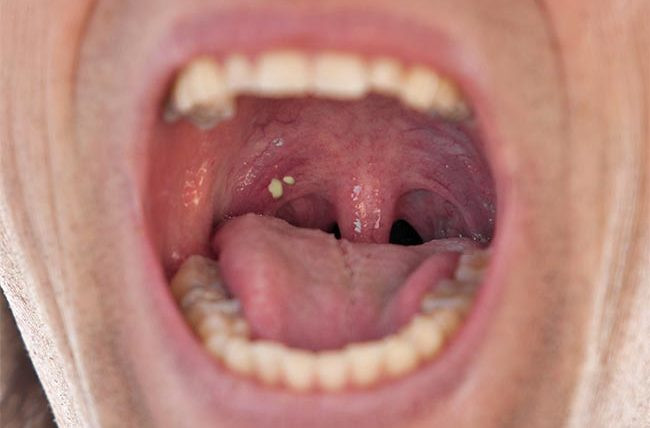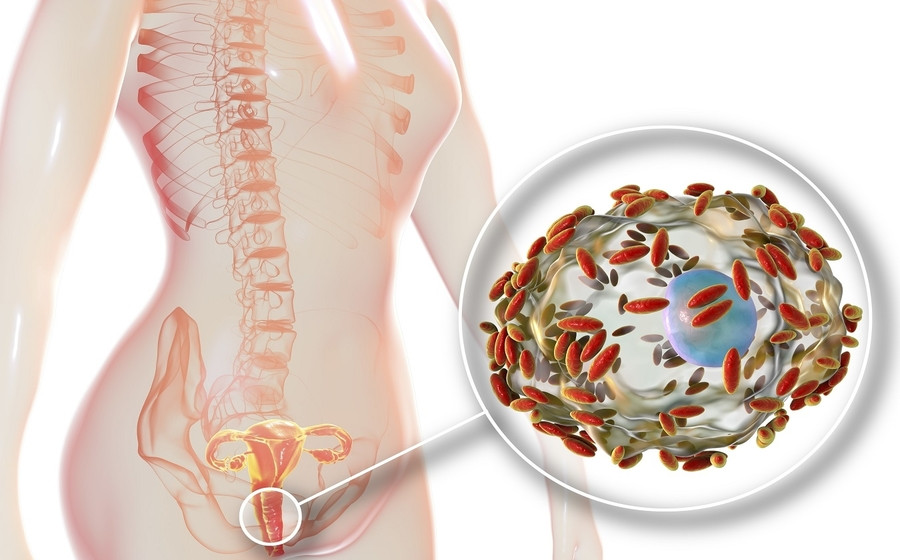Definisi
Batu amandel atau batu, yang disebut juga dengan tonsillolitiasis, adalah benjolan-benjolan kecil yang terdiri dari material padat yang terbentuk pada tonsil (amandel).
Tonsil sendiri adalah sepasang jaringan berbentuk oval yang berada pada bagian belakang tenggorokan. Tonsil memiliki lipatan, lekukan, dan celah-celah yang disebut kripta tonsil. Tonsil merupakan bagian dari sistem imun, yang membantu melindungi tubuh dari infeksi. Fungsi tonsil untuk menangkap virus, bakteria, jamur, dan mikroorganisme lain serta membantu sistem imun melawan infeksi. Namun, mengangkat tonsil tidak mempengaruhi sistem imun Anda.
Batu tonsil adalah kondisi yang sering ditemukan. Banyak orang yang memilikinya dan tidak menyadarinya. Batu tonsil dapat menyebabkan bau mulut meskipun biasanya tidak nyeri atau berbahaya.
Anda biasanya dapat menangani batu tonsil di rumah dengan cara kumur air garam atau waterpik. Namun, jika batu tonsil terjadi berulang atau mengganggu Anda, dokter mungkin akan merekomendasikan tindakan operasi.
Penyebab
Penyebab pasti pembentukan batu tonsil tidak diketahui. Pada beberapa orang, kripta tonsil dapat menangkap zat-zat lainnya, seperti sisa makanan, sel mati, atau bakteria lain. Kalsium dapat menumpuk di sekitar zat yang terperangkap, menyebabkan pembentukan batu tonsil. Material yang terperangkap ini dapat meliputi:
- Mineral seperti kalsium
- Makanan atau sisa makanan
- Kotoran
- Bakteri
- Jamur atau fungi
Faktor Risiko
Orang yang memiliki lebih banyak kripta tonsil cenderung berisiko memiliki batu tonsil. Kondisi ini lebih sering ditemukan pada orang yang telah berulang kali mengalami infeksi tonsil pada masa hidupnya. Batu tonsil cenderung lebih sering terjadi pada anak remaja.
Selain itu, beberapa faktor lain yang dapat berkontribusi terhadap pembentukan batu tonsil meliputi:
- Kebersihan mulut yang kurang
- Tonsil besar
- Masalah sinus kronis (jangka panjang). Sinus adalah rongga-rngga yang berada pada sekitar hidung
- Tonsilitis kronis (peradangan tonsil jangka panjang)
Gejala
Batu tonsil terlihat seperti batu-batu kecil berwarna putih atau kekuningan pada tonsil Anda. Anda dapat memiliki satu atau banyak batu tonsil. Ukuran batu biasanya kecil, meskipun terkadang seseorang dapat memiliki batu tonsil yang berukuran besar.
Beberapa batu tonsil tidak menyebabkan gejala apapun. Jika Anda memiliki gejala, gejala tersebut dapat meliputi:
- Bau mulut (halitosis)
- Batuk lama
- Nyeri telinga
- Nyeri tenggorok
- Rasa tidak enak di mulut
- Ludah yang mengandung batu-batu kecil berwarna putih atau kekuningan
Gejala lainnya meliputi:
- Kesulitan menelan
- Perasaan adanya sesuatu yang mengganjal di tenggorok
- Bercak-bercak putih kecil pada tonsil
- Tonsil yang membengkak
- Infeksi tenggorokan yang sulit diterapi dengan antibiotik
Batu tonsil berbeda dengan tonsilitis. Tonsilitis adalah infeksi tonsil. Kedua kondisi ini dapat menyebabkan bau mulut dan nyeri tenggorokan. Biasanya, jika Anda menderita tonsilitis, Anda juga akan memiliki tonsil yang kemerahan dan meradang, yang disertai dengan nyeri tenggorok, demam, dan nyeri kepala.
Jika Anda ingin mengetahui lebih lanjut mengenai tonsilitis, Anda dapat membacanya di sini: Tonsilitis - Definisi, Penyebab, Gejala dan Pengobatannya
Diagnosis
Untuk mendiagnosis batu tonsil, dokter akan melakukan wawancara medis, pemeriksaan fisik dan pemeriksaan penunjang.
Wawancara Medis
Wawancara medis adalah wawancara yang dilakukan antar dokter dan pasien. Dokter akan bertanya mengenai:
- Gejala yang dialami saat ini
- Riwayat kesehatan
- Riwayat minum obat tertentu
- Riwayat penyakit keluarga
Pemeriksaan Fisik
Kemudian dokter akan melakukan pemeriksaan fisik umum dan khusus. Pemeriksaan fisik umum meliputi pengukuran tekanan darah, laju pernapasan, denyut nadi dan suhu tubuh. Selanjutnya pada pemeriksaan fisik khusus, dokter akan melihat bagian dalam mulut dan tenggorokan Anda.
Pemeriksaan Penunjang
Jika dibutuhkan, dokter akan melakukan pemeriksaan penunjang berupa pemeriksaan radiologi. Rontgen X-ray biasanya digunakan jika Anda tidak memiliki gejala apapun atau ketika batu tonsil sulit dilihat saat pemeriksaan fisik.
Terkadang, dokter menemukan adanya batu tonsil secara tidak sengaja saat pemeriksaan. Dokter gigi juga dapat menemukannya saat pemeriksaan gigi.
Tata Laksana
Kebanyakan batu tonsil tidak berbahaya, namun Anda biasanya ingin membuangnya karena dapat menyebabkan bau mulut atau ketidaknyamanan. Tidak ada metode terapi spesifik untuk batu tonsil.
Anda dapat mencoba beberapa metode di rumah untuk membuang batu tonsil, yaitu:
- Berkumur. Berkumur agresif menggunakan air garam hangat dapat memiliki beberapa manfaat yaitu membantu mengurangi bengkak dan ketidaknyamanan. Tenggorokan Anda akan lebih nyaman dan batu tonsil juga dapat terlepas. Cara ini bahkan juga dapat mengurangi bau mulut. Hal ini terutama berguna bila Anda berkumur setelah makan untuk mencegah makanan dan sisa makanan tersangkut di kripta tonsil. Cobalah berkumur dengan campuran 240 cc air hangat dan 1 sendok teh garam
- Batuk. Beberapa orang mengatakan bahwa batuk yang kencang dapat menyingkirkan batu tonsil
- Menggunakan obyek. Jika berkumur dan batuk tidak dapat menyingkirkan batu, Anda mungkin akan tergoda menggunakan jari atau sikat gigi untuk menyingkirkan batu tonsil. Namun, membuang batu sendiri dengan barang yang keras seperti sikat gigi dapat dengan mudah menggores tonsil, jaringan yang rentan ini. Hal ini akan menyebabkan infeksi. Oleh karena itu, penting untuk membuang batu dengan lembut. Membuang batu tonsil dapat berbahaya dan menyebabkan komplikasi seperti perdarahan dan infeksi. Jika Anda memutuskan untuk membuangnya secara manual, gunakan waterpik atau cotton bud. Alat ini adalah pilihan yang lebih baik dibandingkan sikat gigi.
- Menggosok gigi dengan teratur
Antibiotik biasanya digunakan untuk menurunkan jumlah bakteri yang memegang peranan penting dalam pembentukan dan pertumbuhan batu tonsil. Namun, pada kebanyakan kasus, dokter tidak menggunakan antibiotik. Obat-obatan ini tidak bermanfaat untuk menangani penyebab yang mendasari terbentuknya batu tonsil. Anda akan membutuhkan antibiotik jika Anda mengalami infeksi bakteri pada tonsil.
Dokter dapat merekomendasikan tindakan operasi pembuangan batu tonsil jika batu tonsil:
- Berukuran besar
- Menyebabkan nyeri atau masalah lain
- Menyebabkan infeksi tonsil atau sakit tenggorokan berulang
Salah satu prosedur yang dapat digunakan adalah koblasi kriptolisis yaitu teknologi laser yang dapat membantu meratakan permukaan tonsil yang dapat menangkap zat buangan. Dokter sering melakukan prosedur ini menggunakan anestesia atau bius lokal. Prosedur laser biasanya menyebabkan ketidaknyamanan yang lebih ringan dan memiliki waktu penyembuhan yang lebih cepat. Menurut suatu studi pada tahun 2021, prosedur ini lebih baik dibandingkan dengan tonsilektomi.
Pada beberapa kasus, dokter akan merekomendasikan tonsilektomi (pembuangan tonsil). Prosedur ini dapat membantu bila batu tonsil terus terbentuk atau jika batu menyebabkan infeksi berulang yang berat, serta bila metode lain sudah dicoba namun tidak berhasil.
Komplikasi
Meskipun jarang, Anda dapat mengalami komplikasi batu tonsil. Sebagai contoh, berkembangbiaknya bakteri di dalam batu dapat menyebabkan bau mulu dan kerusakan gigi.
Batu tonsil yang besar juga dapat merusak dan mengganggu jaringan tonsil yang normal. Hal ini dapat menyebabkan pembengkakan, peradangan, dan infeksi yang signifikan.
Pencegahan
Anda dapat melakukan beberapa cara untuk mencegah batu tonsil:
- Menggosok dan melakukan flossing secara rutin. Pastikan Anda menggosok bagian atas dan bawah lidah juga
- Berhenti merokok
- Kumur dengan air garam setelah makan
- Menggunakan waterpik untuk membersihkan mulut Anda dan membantu menyingkirkan adanya batu tonsil
- Jaga hidrasi dengan minum cukup air
Kapan Harus ke Dokter?
Batu tonsil adalah kondisi yang sering ditemukan. Hal ini jarang menyebabkan masalah kesehatan yang serius. Banyak orang memiliki batu tonsil dan bahkan tidak mengetahui bahwa mereka memilikinya.
Anda sebaiknya berkonsultasi dengan dokter Anda bila:
- Perawatan di rumah tidak memberikan hasil
- Batu tonsil terjadi berulang dan mengganggu aktivitas sehari-hari
- Anda ingin mendiskusikan pilihan terapi lainnya
Mau tahu informasi seputar penyakit lainnya? Cek di sini, ya!
- dr. Monica Salim
Tonsil Stones (tonsillolith): Causes, symptoms, removal & treatment (2021) Cleveland Clinic. Available at: https://my.clevelandclinic.org/health/diseases/21505-tonsil-stones (Accessed: November 15, 2022).
Gotter, A. (2022) Tonsil stones: Symptoms, treatments, prevention, removal, Healthline. Healthline Media. Available at: https://www.healthline.com/health/dental-and-oral-health/tonsil-stones#causes (Accessed: November 15, 2022).
Tonsil Stones (tonsilloliths): Symptoms, causes, treatment, and prevention (2021) WebMD. WebMD. Available at: https://www.webmd.com/oral-health/guide/tonsil-stones-tonsilloliths-treatment-and-prevention (Accessed: November 15, 2022).











